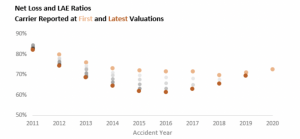Let’s spend a minute on all things workers’ comp – and one COVID note.
First up, the fine folk at WCRI – in particular the eminent Bogdan Savych PhD – are putting on a free webinar on the
Effects of Opioid-Related Policies on Work-Related Injuries
– register here. This is particularly helpful for me; I’m helping out on a Federal research project comparing outcomes, impacts, and patient experiences from opioid programs and regulations in Washington and Ohio. Thanks to all taxpayers for helping fund this project – this is some really interesting work that I am quite sure will increase our understanding of opioid management.
NCCI just released their annual analysis of work comp industry reserves… And boy oh boy are there are a LOT of extra reserves sitting in payers’ coffers.
Key takeaway – NCCI-projected industry loss and LAE ratios continue to be below those reported by carriers.
Said another way, carriers are NOT releasing these excess reserves in the form of dividends or credits or whatever. My take – carriers are salting away dollars to protect their future profits from the inevitable – but much delayed – market turn.
While one may think this is a one-time difference between carriers and NCCI, the data clearly shows otherwise. Over the last decade insurers have consistently over-estimated claims and admin costs – especially from 2014 to 2017. (graph courtesy NCCI)

So here’s my take – carriers are over-reserving because their actuaries haven’t yet figured out the rapid decrease in opioid utilization is having a major impact on claim duration, indemnity expense and medical costs. Carriers were well behind the curve when opioid use exploded in the middle of the last decade, and they are repeating that error now on the downside.
As a long-time – as in 27 years – consultant, I’m always on the lookout for advice for clients about working with consultants. Great piece in Harvard Business Review on that topic…key takeaways are consistent with my experience:
- first and most important, spend the time to define the problem(s) you are looking to solve for. That will save untold weeks – and thousands of dollars billed
- all parties should be humble and very open-minded – including the consultant
- don’t assume you know the solution; going to RFP should be an option, but not the first one to address a market need, performance issue or vendor problem
File this away and pull it out next time you look to engage a consultant – me or anyone else!
One COVID fact check…I’ve heard from a couple folks that migrants on the southern border are a major source of COVID infections – partially because they aren’t being tested. Well, all are being tested, and the test positivity rate is actually much lower than among residents of border counties.
(note that a recent report indicating 18-20% of migrants leaving Border Patrol custody tested positive specifically includes ONLY those migrants targeted for “expedited removal” and thus is not a complete sample of all migrants)
While those two data points don’t completely address the assertion that migrants are the cause of infections (and there’s no way to prove or disprove that assertion) – it is clear that COVID infections in those border counties would be a lot lower if more residents wore masks and were vaccinated.
What does this mean for you?
Always check your sources, be humble, and do your research.


